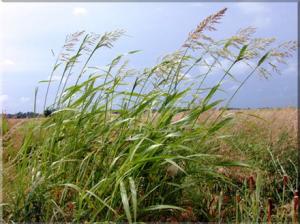UTIA Researchers Find Another Glyphosate Resistant WeedResistant Johnsongrass Discovered in Two West Tennessee Counties
From Ginger Rowsey, UTIA Marketing and Communications
JACKSON, Tenn. – Researchers with the University Of Tennessee Institute Of Agriculture have confirmed the discovery of glyphosate-resistant Johnsongrass in Lauderdale and Fayette counties in West Tennessee. Studies showed that Johnsongrass from fields in these counties survived glyphosate at 2-3 times the labeled rate. Greenhouse screenings were conducted at the West Tennessee AgResearch and Education Center.
Glyphosate-resistant Johnsongrass has been confirmed in Arkansas and Mississippi since 2008. While there have been reports of glyphosate misses on Johnsongrass in Tennessee, this is the first time researchers have been unable to control suspected populations in a greenhouse setting. Johnsongrass is the sixth confirmed glyphosate-resistant weed species in Tennessee.
Glyphosate is an herbicide that is widely used to control Johnsongrass in Tennessee’s major agronomic crops: corn, cotton and soybeans. Research has shown that uncontrolled Johnsongrass can significantly reduce crop yields. However, Larry Steckel, UT Extension Weed Specialist, says there are some viable herbicide options for controlling this weed. Steckel recommends clethodim for cotton and soybeans and nicosulfuron for corn. Another option is glufosinate; however, Steckel says it will require sequential applications.
Editor’s notes:
Glyphosate is the active ingredient in the herbicide Roundup. It has been widely used for about 40 years, and with the introduction of GM crops that are Roundup resistant, its use has increased significantly in the last 20 years.
In a white paper published by MIT (Massachusetts Institute of Technology) on Roundup Ready Crops, the author writes: “One of the main concerns about genetically engineered crops such as Roundup Ready crops is the development of weeds and other plants that are also resistant to Roundup (glyphosate). An article recently published in Science Daily suggests that farmers are becoming too reliant on Roundup. The use of Roundup Ready crops has become ubiquitous. This has resulted in weeds such as giant ragweed that are resistant to Roundup, when Roundup was the herbicide developed explicitly to combat these weeds. If a farmer were to grow on Roundup Ready crops, they would have to use Roundup to treat their fields, increasing resistance to the herbicide. It is recommended that farmers rotate Roundup Ready crops with other crops and use alternate herbicides to help prevent resistance.”
(Source: web.mit.edu/demoscience/Monsanto/impact.html]
If you are looking for non-toxic ways to manage Johnsongrass, look no further than the Mid-South Horse Review. Ehow recommends Newspaper Mulch as an effective way to control Johnsonsgrass in yards. “Use newspapers to smother and kill unwanted Johnson grass in your yard. Mow the grass down as short as possible and discard clippings. Spread piles composed of eight to 10 sheets of nonglossy newspaper over the grass, [i.e., old issues of the Mid-south Horse Review]. Overlap edges of adjacent sheets by 3 to 4 inches to prevent sunlight, air or watering from reaching the grass below.
Spread a 2- to 4-inch-thick layer of organic mulch, such as wood chips [or manure & shavings from stall cleaning] over the sheets of newspaper to weigh them down and hold them in place. You also could sprinkle water over the chips to keep them from blowing away. This newspaper mulch kills unwanted Johnson grass in two to four weeks and begins to decompose in the soil, enriching it with beneficial organic matter.”
Spread a 2- to 4-inch-thick layer of organic mulch, such as wood chips [or manure & shavings from stall cleaning] over the sheets of newspaper to weigh them down and hold them in place. You also could sprinkle water over the chips to keep them from blowing away. This newspaper mulch kills unwanted Johnson grass in two to four weeks and begins to decompose in the soil, enriching it with beneficial organic matter.”
Ehow also reports that household White Vinegar is an inexpensive, effective way of killing Johnsongrass. “Because the acetic acid in the vinegar burns the grass, check the percentage of the acid that the particular brand of vinegar contains. The higher the acid content, the more effective it is in eradicating the weed. Apply vinegar in spring when the grass is young or during fall when it is building food reserves in its rhizomes. Spray vinegar directly over each grass plant, dousing it completely. Cover any desirable plants nearby with a cloth or tarp to protect them in case of accidental spray.”
[Source: www.ehow.com]









